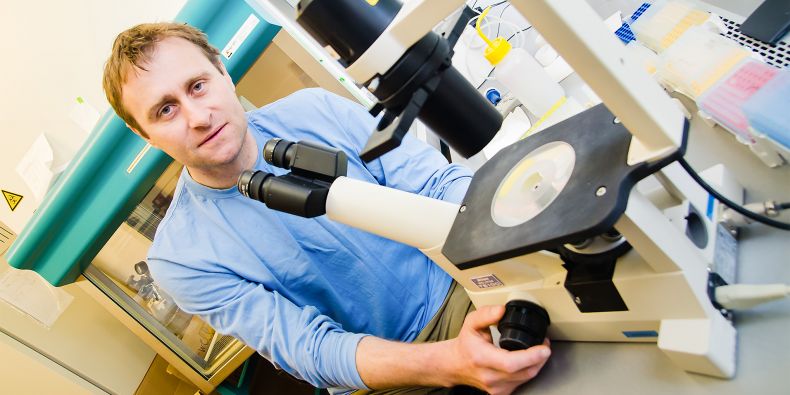Dalibor Blažek, who leads a research team at Ceitec MU, has two great successes to his name: he has discovered a new protein that is a factor in the maintaining of the genomic stability of cells, and he has been awarded an American grant for the conducting of a pilot study in ovarian cancer biology.
These two things are closely related. Blažek and his colleagues are interested in the regulation of gene expression, i.e. the process by which genetic information is converted from DNA to specific proteins, most significantly the transcription of genetic information from DNA to RNA, by which proteins are then produced. “What interests us most is the regulation of transcription using RNA polymerase enzymes. Many proteins feature here, one of which – cyclin-dependent kinase 12 – we discovered. We believe that its deregulation is instrumental in the development of ovarian cancer," says Blažek.
The cyclin-dependent kinase 12 protein complex is important in ensuring that there are no changes in the cell to the genetic information recorded in the DNA. But if this protein is mutated, it will not fulfil its function, perhaps resulting in cancerous growth and tumour formation. “We're interested in the role of this protein in the maintaining of genomic stability," adds Blažek. “We'll test it on tissue cultures, for instance."
Money for pilot study
The prospect of such a role for the newly discovered protein attracted the attention of the Marsha Rivkin Center foundation, which supports research in ovarian cancer biology. The Pilot Study Award is given for the processing of pilot studies and experiments. Blažek explains: “This money allows us to acquire more specific information on how proteins work. If this information interests us, we can use it as a basis for application for more research grants."
He was given a year's research award of 75,000 US dollars – about one and a half million Czech crowns. It is a prestigious achievement not least because the foundation tends to favour American scientists, awarding only a few grants a year to scientists outside the United States. Its principal criteria are innovation in and potential of proposed research that might lead to the better understanding of the molecular basis of ovarian cancer and improvements in its detection and therapy.
Chance plays a part
About two years ago scientists at Ceitec MU published details of the discovery of the new protein and its role in maintaining genomic stability. “We weren't focused solely on finding that particular protein – we were interested in other proteins and processes in the cell," explains Dalibor Blažek. “In the beginning we weren't even sure of the role it might play in the origination of ovarian and some other cancers. We detected the potential importance of the new protein in further experiments." He adds that they were helped by other scientific publications, which described the protein under examination as one of the most mutated in ovarian cancer.
Definite results of research in the form of better diagnostics and treatment of ovarian cancer cannot be expected in less than ten years. Blažek describes the essence of his work thus: “Our research is purely elementary. We're interested in precise molecular mechanisms for the regulation of processes within the cell. Only in a small percentage of cases do we come up with something that is directly applicable in the treatment of disease. Nevertheless, the results of elementary research can lead to the defining of completely new, more effective approaches that bring us closer to clear results in the treatment of patients."
